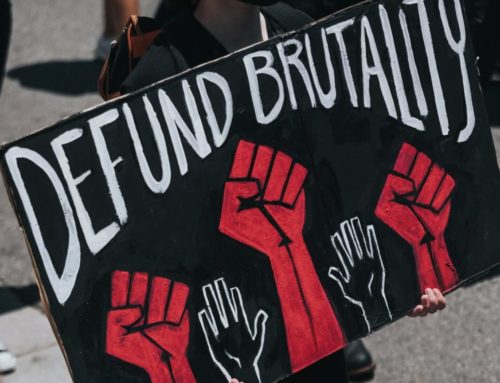In December 2014, Organization for Black Struggle launched their Quality Policing Initiative:
The killings of Mike Brown, Kajieme Powell, Vonderrit Myers and others are not the result of abnormal incidents resulting in accidents, nor do these killings reflect “one bad apple” police officer. It is a manifestation of a system of policing that is unaccountable, out of control and acts from its worst impulses of racism and aggression. It sees black and brown citizens as individual targets and whole communities as collective threats. The existing situation means that too frequently there will be random and unlawful executions of individual targets, and police forces will have negative and even predatory relationships with the communities that they are supposed to be serving and protecting, instead of killing and harassing.
As a result of the current system of policing we have been stripped of our citizenship and robbed of our Constitutional and Human Rights by the very people we pay and empower to protect these rights. This is intolerable, but there is a solution that maintains our best values and creates the proper relationship between policing authorities and the people who vote them into office and pay for their protection. That solution is the Quality Policing Initiative.
We want a Quality Policing Initiative that is based on the concept that police are hired to defend the personal safety and the Civil, Constitutional and Human Rights of every person they serve and protect first and foremost.
Our Quality Policing Initiative makes all five phases of policing authority—(1) recruitment, (2) training, (3) deployment, (4) accountability and (5) advancement—responsive to the communities that they are policing and to the elected officials who regulate and deploy them.
Our Quality Policing Initiative can be reached many ways. Any one piece of it is a step in the proper direction but only by adding significant community-driven involvement, as spelled out in the Initiative, can we truly put policing into a proper relationship with the community it is empowered to protect and serve.
We are asking that St. Louis Metropolitan Police Department, the St. Louis County Police Department and the 42 individual police departments voluntarily sign on to our Quality Policing Initiative and to work with the community to put the model in place.
We are advocating legislation at the state, county and local levels to make our Quality Policing Initiative law and will be holding elected officials accountable for the present levels of oppression, violence and impunity that defines most police relationships. Every death and/or injury going forward is and continues to be the fault of the elected officials who have allowed this predatory system to continue to grow.
We will be working with human rights and other organizations to compel the Department Of Justice to do its job and hold every policing body in St. Louis County and the City of St. Louis accountable for their demonstrated lack of accountability. We will be advocating for the investigation, monitoring, control and even dissolution of any policing body opposed to our Quality Policing Initiative.
We will be working to dismantle the current structure that undergirds the Human and Civil Rights violating relationship between the community and the policing authorities. We will change the culture one politician, police officer and law at a time.
Below are the components of the Quality Policing Initiative:
Recruitment:
- Residency Requirements: Police Officers must live within the jurisdiction that they police.
- Affirmative Action: hiring for racial and gender parity is a minimum requirement so that the police reflect the population they are policing.
Training:
- Enhanced Personal Unarmed Combat Training: Police should have to qualify in unarmed combat to give them more confidence and less dependence on their weapons in street encounters.
- Conflict Resolution Training: An officer should be taught to and rewarded for deploying de-escalation/conflict resolution training.
- Threat Progression Training: Police should be taught that there are different levels of response to the public so that they only use force as a last resort, and then only against violent individuals.
- Anti-Racism Training: An officer must be trained in cultural core competencies.
Deployment:
- Demilitarize All Police Forces: Withdraw from the Department Of Defense 1033 (DOD 1033) Program and withdraw from the Forfeiture/Seizure Program to buy military grade gear.
- Stop Using the Police as Collection Agents: Remove ticket quotas and fees and fines as primary mechanisms to fund municipal government.
- Implementation of field contact cards or reports for traffic stops and investigative stops based on suspicion of criminal activity containing race and gender of persons stopped: The cards should be retained for 24 months and, in addition to the age, race and gender of the person stopped should include (a) the officer’s name, race, and badge number; (b) approximate time and location; (c) whether the stop involved a frisk or pat-down search; (d) any weapons, evidence or contraband found during the search; (e) whether the individual involved was arrested or cited, and if so, the charges.
- SWAT/Lethal Force Parameters: Designed in conjunction with the Citizen’s Review Board/Civilian Accountability Project.
- First Response Escalation Model: Police responses will not begin at lethal force but will scale up to it and the guidelines will be designed in conjunction with the Citizen’s Review Board/Civilian Accountability Project.
Accountability:
- Creation of an effective and automated Early Warning System: In order to produce an effective disciplinary/rewards system we recommend that there be an automated Early Warning System that consists of a database that takes into account the following: (a) numbers and patterns of disciplinary complaints against each officer by citizens and police personnel; (b) allegations of racial bias and domestic violence, civil actions against the officer; (c) use of force as documented in the “use of force” reports; (d), illegal entries and searches as documented in the “search and seizure” reports; (e) other reliable indicia of “at risk” officers and which recommends increased monitoring, supervision, and/or counseling of the officer when the threshold for triggering action by the Early Warning System is reached.
- Media Accountability System: Body and Dash cameras where the data is controlled by a Citizen’s Review Board/Civilian Accountability Project entity and shared with the community and police together.
- A Citizen’s Review Board/Civilian Accountability Project: The Board must have subpoena, investigatory and prosecution powers. The Board should also have a role in developing police policies and setting standards that impact all five areas of policing (recruitment, training, deployment, accountability and advancement).
- Civilian complainants must be treated equally with the accused officer: We propose and recommend that civilian complainants be treated equally with the officer in question. Both the civilian and the officer must be questioned in the same detail about the alleged conduct, the officer’s word must not automatically be accepted over that of the civilian, and reasons must be given for sustaining or not sustaining all cases.
- Consideration of substance and patterns of civilian complaints of officer misconduct by the Citizen’s Review Board/Civilian Accountability Project (CAP) and Internal Affairs Division (IAD) investigators and supervisors: We propose and recommend that the substance and patterns of all civilian complaints of police misconduct against an officer be considered by police disciplinary investigators, supervisors, and internal auditors, and that disciplinary complaints of misconduct be included in the periodic evaluations of officers, considered in promotion decisions and that nothing in the Police Union contract shall be interpreted to interfere with this.
- We propose a Four Step disciplinary process: Investigation, findings and disciplinary recommendation of CAP and IAD investigators should be made available to the public wherein Civil litigation or Civil Rights may have been violated and to the County Prosecutor’s Office. (a) Review and concurrence or non-concurrence by CAP or IAD supervisors and administrative heads of the agencies; (b) Review of findings and recommendations by the Chief of Police; (c) Review of cases by the County Prosecutor’s Office & the CAP where discipline of more than five days is recommended or if criminal charges are going to be pursued. Officers will still have the right to challenge any disciplinary action that does not result in a criminal charge, in court; (d) The Police Department will make available statistics on how many punishments are reversed or reduced through the grievance procedure thereby making evaluation of the frequency and severity of punishment in the disciplinary process possible and transparent.
- Immediate supervisors have responsibility for discussing all disciplinary complaints with their subordinates and recommending additional monitoring, counseling, and/or training when appropriate.
- Creation and implementation of “use of force” and “search and seizure” reports: We propose and recommend that all officers develop and require all officers to complete written: (a) “use of force” reports to be filled out by any officer using type of force greater than escort and compliant cuffing; (b) “search and seizure” reports to be filled out when any officer (1) performs a warrantless search (excluding searches incident to arrests, frisks, and pat-downs (2) performs a body cavity or strip search, or (3) conducts any warrantless seizure of property (excluding towing vehicles) and that these reports as well as all disciplinary complaints be routinely monitored by the CAP to determine abuses and patterns of abuses.
- Police officers who provide information about other officers’ wrongdoing be protected from reprisals: Police officers who provide information about other officers wrongdoing should be given protection from reprisals and where necessary rewards for providing testimony concerning other officers wrongdoing by allowing transfers to other units and in some cases promotions. Investigators should be permitted to reward officers who risk personal harassment by disclosing other police officer’s misconduct. The promise of rewards is a necessary and effective tool in discovering and eliminating misconduct within any close association of people.
- CAP and IAD accept anonymous complaints: We further propose that anonymous complaints of police abuse of citizens be accepted, instead of the current ordinance prohibiting anonymous complaints except where criminal conduct is alleged.
- Records of disciplinary complaints against officers and their dispositions should be maintained during and for three years following an officer’s employment: We further propose that records of disciplinary complaints by citizens and dispositions of these complaints be maintained during the employment history of the officer and for three years following in the event he/she may seek to resume employment.
- Every police jurisdiction should produce printed annual reports and make monthly statistics sufficiently available to allow public monitoring and reasonable analysis of the disciplinary system and should monitor the field contact cards to determine if and where racial profiling is taking place: These reports must include by unit, district and countywide (a) the number and type of Complaint Registers, (b) who investigated the complaints (CAP, IAD, or the officer’s supervisor), including the disposition by category of the complaints (i.e. sustained, not-sustained, unfounded, and exonerated), the punishment recommended at each phase of the process, and the actual punishment meted out at the end of the arbitration process. [Current reports are particularly lacking in describing what punishments if any are actually meted out in what types of cases and in describing how frequently the CAP investigator’s findings and recommendations for punishment are reversed or reduced in the disciplinary process.
- Participatory Budgeting: Control of amount and spending of police funds through a community process.
- Enhance FOIA Process.
Advancement:
- Consideration of substance and patterns of civilian complaints of officer misconduct by the Citizen’s Review Board/Civilian Accountability Project (CAP) and IAD investigators and supervisors: We further propose and recommend that the substance and patterns of all civilian complaints of police misconduct against an officer be considered by police disciplinary investigators, supervisors, and internal auditors, and that disciplinary complaints of misconduct be included in the periodic evaluations of officers, considered in promotion decisions and that nothing in the Police Union contract shall be interpreted to interfere with this.
- Advancement is based on demonstrated expertise and commendations: This is in field use of Quality Policing training competencies and not carrying too many censures from the accountability section of the initiative.
- Adherence to Best Practices Connected to Advancement: People who are promoted demonstrate Quality Policing practices and those who don’t are not promoted.
Download OBS_Quality_Policing_Initiative_Update_Jan_2015.pdf
Read about the Initiative on OBS’s website.



